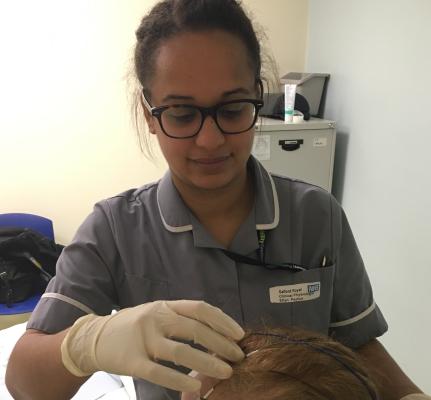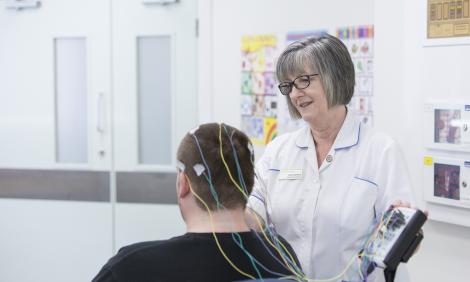Neurophysiology
Healthcare science staff working in neurophysiology investigate the function of the central and peripheral nervous system to diagnose and manage a range of neurological and non-neurological disorders.
You'll work with a diverse group of patients from babies and young children to adults of all ages.
Life in neurophysiology
You’ll play a vital role in diagnosing and managing neurological disorders that affect many people, for example epilepsy, which affects around 1% of the UK population.You’ll also play an important role in diagnosing and monitoring of people who have a disorder affecting the brain, such as encephalitis, meningitis and stroke.
Teamwork and collaboration will be key skills as you’ll work alongside other healthcare professionals, including doctors specialising in neurology, neurosurgery or intensive care and other workforce such as nurses, allied health professionals and healthcare scientists.You’ll work across many hospital departments and settings including general wards, emergency department, intensive care and operating theatres; as well as working within community settings.
Typically, you’ll conduct:
- EEG (electroencephalography) - a recording of the electrical activity of the brain from the scalp, which is mainly used in the diagnosis and monitoring of epilepsy
- evoked potentials - these are potentials produced by the brain in response to specific stimuli, for example a flashing light. Evoked potentials are used in the diagnosis of various conditions including multiple sclerosis.
- EMG (electromyography) and NCS (nerve conduction studies) - these assess the function of the nerves and muscles within the body. Carpal Tunnel Syndrome is commonly diagnosed using NCS. EMG is used in conditions affecting nerve and muscle function including myasthenia gravis and motor neurone disease
Ellyn Payton
Specialist clinical physiologist, neurophysiology
Read Ellyn's storyI liked the idea that I could help people and make a difference without being as hands on as a nurse.

How much can I earn?
You’ll be employed on a national pay and conditions system called Agenda for Change (AfC).There are nine pay bands and below are examples of the pay band you’ll be on, depending on your role within neurophysiology:
- healthcare science assistant – B2/3
- healthcare science associate – B4
- healthcare science practitioner – B5
- clinical scientist – B6/7/8a
- consultant clinical scientist – B8a-d
How about the benefits?
- make a difference
- flexible and part-time working
- high income early in your career
- work anywhere in the world
- excellent pension scheme
- good holiday entitlement
- NHS discounts in shops and restaurants
How to become a clinical scientist in neurophysiology
Starting your career in neurophysiology might be easier than you think. You could undertake study at university or find an apprenticeship that takes you straight into a job.
There are a wide variety of entry levels into neurophysiology such as assistant or level 2 apprenticeships, associate practitioner roles, level 4 apprenticeships. If you’re already a registered and experienced healthcare scientist, there are degrees, Master’s degrees and Higher Specialist Scientist Training.
See our How to become a healthcare science professional page for the details.
Must-have skills
- excellent communication skills to manage a wide range of relationships with colleagues, patients and their families
- emotional resilience, a calm temperament and the ability to work well under pressure
- teamwork and the capacity to lead multidisciplinary teams
- problem-solving and diagnostic skills
- outstanding organisational ability and effective decision-making skills
- first-class time and resource management for the benefit of patients
Entry requirements
There are several different ways to start your career in neurophysiology, depending on your experience and qualifications.
Apprenticeship
You could look for an entry level job/level 2 apprenticeship – typically GCSEs 9-4/A-C in maths, English and a science. If an apprenticeship feels right for you, you’ll need 5 GCSEs at 9-4/A-C (or equivalent) including maths, English and science or Level 2 Diploma in Healthcare Science to start a level 4 apprenticeship.
Associate practitioner
An associate practitioner role is another route to a career in biomedical science. You’ll likely require foundation degree, or equivalent experience with training and experience to NVQ level 3.
Degree-level qualification
A level 6 apprenticeship or degree course require relevant level 3 qualifications, for example three A-levels (including at least one science subject) or an Access to higher education course.





